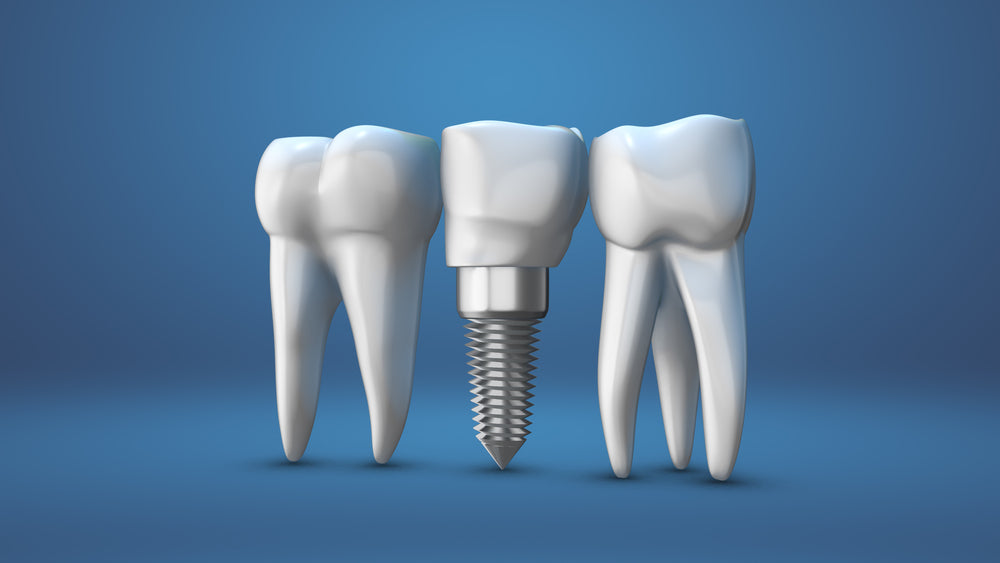
101 Guide to What Is a Dental Implant
|
Time to read 6 min
Published on
|
Time to read 6 min
Dental implants have become a popular option for people with missing teeth or those who require tooth replacements. Implants are surgically placed into the jawbone and can provide a sturdy base for dental prosthetics such as crowns, bridges, or dentures. While dental implants are typically successful, individuals with bone loss may wonder if they are eligible for this treatment.
When patients have experienced a substantial loss of either bone or bone density, proper acceptance of dental implants into the jaw can be made much more difficult. If you're thinking about getting dental implants, you'll be glad to know it's possible even with sub-optimal conditions. In this article we will provide detailed answers to your query Can I Get Dental Implants with Bone Loss?
A dental implant is one of the best tooth replacement options with bone loss and is usually a titanium post placed into your jaw bone that acts as an anchor in the place of the tooth root. Permanent or removable dental prostheses (such as dentures, crowns, and bridges) are then secured to the titanium root. It is currently the best and most effective way to replace missing teeth due to how sturdy and that they can also support artificial teeth.
What are the Different Types of Dental Implants ?
There are several types of dental implants available, and each type offers its unique advantages and disadvantages. Here are the most common Types of Dental Implants :
Discover More: Differentiating Types Of Tooth Pain, A Guide
What to Expect During Dental Implant Surgery?
Since installing dental implants could mean major surgery, patients need to first complete an extensive evaluation in order to prepare for the procedure. This includes:
A Thorough Dental Assessment
A comprehensive dental examination provides your dentist with a comprehensive image of the health of your jaw and teeth. Dental X-rays and 3D pictures along with models of your jaw and teeth will be drawn out.
Medical History
Inform your doctor of any medical conditions you may have (or have had) or the medications you're taking, including prescription, over-the-counter or herbal remedies.
Treatment Plan
The program is customized to your individual needs and takes into account factors like the number of teeth that have to be replaced and the health of your jawbone and the remaining teeth.
Removing the Damaged Tooth
Some dental implants permit the removal of damaged teeth and their immediate replacement by implants. In most instances, the damaged tooth needs to be removed and the affected area must heal before taking the next step.
Jawbone Preparation (Grafting), If Needed
If your jawbone is not strong enough to support an implant, your dentist may recommend bone grafting. This involves taking a small amount of bone from another part of your body or using synthetic bone material and placing it in the jawbone to create a stronger foundation for the implant.
Dental Implant Placement
Once the jawbone is ready, the dentist will place the implant into the jawbone. This involves making a small incision in the gum tissue and drilling a small hole into the jawbone. The implant is then screwed into the hole and covered with a protective cap.
Bone Growth and Healing
After the implant is placed, the bone around it needs to heal and grow. This process, known as osseointegration, can take several months. During this time, the implant fuses with the surrounding bone, creating a stable base for the artificial tooth.
Abutment Placement
Once the bone has healed and grown around the implant, the protective cap is removed, and an abutment is attached to the implant. The abutment is a small connector piece that connects the implant to the artificial tooth.
Artificial Tooth Placement
The final step in dental implant surgery is placing the artificial tooth. This involves taking an impression of your mouth and creating a customized crown or bridge that fits onto the abutment. The artificial tooth is then attached to the abutment, completing the dental implant process.
Follow Up-After the Procedure
The patient is given follow-up visits to ensure that the implant is perfectly in place and no other serious issues are present.
Discover More: Do You Know? What Are The Most Common Oral Infections In The World
Taking Care of Your Dental Implants
Dental implants have a commendable success rate, but occasionally the metal implant fails to fuse seamlessly with the bone. In such a scenario the implant must be extracted. But fret not - your dentist will tidy up the area and attempt the procedure anew after three months.
To ensure your dental work stands the test of time, it is imperative to adopt a stringent oral hygiene regimen, schedule regular appointments with your dentist, and steer clear of habits that can damage your teeth. Activities like crunching on hard candies or ice can wreak havoc on your crowns and natural teeth. Additionally, abstaining from tooth-staining products like tobacco and caffeine can help preserve your pearly whites. And, if you tend to grind your teeth, it is crucial to seek the right treatment.
Effective bad breath remedies include:
Gentle and regular scraping of the tongue
Regular oral care practices such as daily brushing and flossing
Professional deep cleanings and plaque removal
The ongoing use of oral probiotics.
One, the probiotics compete with the existing bad bacteria and reduce their presence by “crowding them out”
Two, the probiotics produce BLIS or “bacteriocin-like-inhibitory-substances” which is a technical way of stating that one probiotic strain (bacteria) can produce a substance that inhibits or kills off other bacteria. Three, by working to control gingivitis, gum disease and tooth decay these probiotics reduce the very sources of bacteria-generated odors in the mouth.
Studies have shown a clear reduction in plaque levels and gingivitis symptoms when oral probiotics were administered to patients with moderate to severe gingivitis.